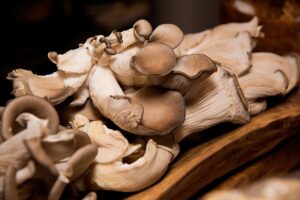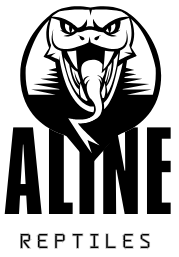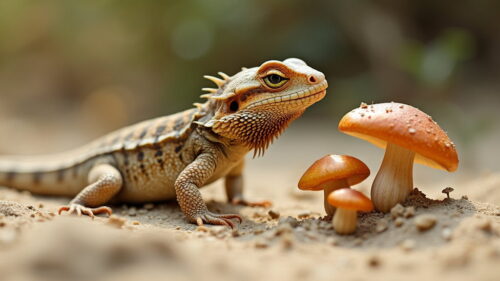In this article, we’ll dive deep into the question: Can bearded dragons eat mushrooms? We’ll discuss the potential risks, what makes mushrooms dangerous for your pet, and what you should be feeding your bearded dragon instead to keep them healthy and thriving.
Bearded dragons are fascinating, friendly reptiles that make great pets. As a responsible pet owner, one of the most important aspects of caring for your bearded dragon is ensuring they have a healthy, balanced diet.
There are so many different food options to choose from, but what about mushrooms? With their rich appearance and nutritional value, they might seem like a tempting choice for your pet. However, before you reach for that mushroom cap, it’s crucial to understand whether or not they’re actually safe for your bearded dragon.
Are Mushrooms Safe for Bearded Dragons?

No, mushrooms are not considered safe for bearded dragons. Mushrooms, although a common food in many human diets, present several concerns when it comes to bearded dragons. While some species of mushrooms might seem harmless, most experts recommend avoiding them entirely.
This is primarily due to the potential health risks they pose to bearded dragons, which can include toxicity, digestive issues, and nutrient imbalances.
The Risks of Feeding Mushrooms to Bearded Dragons
- Toxicity: Certain species of mushrooms, especially wild mushrooms, can be extremely toxic to reptiles. Many of these mushrooms contain harmful substances that can lead to severe poisoning.
- Digestive Issues: Mushrooms are made up of chitin, a tough, fibrous material that can be difficult for bearded dragons to digest. This can lead to stomach upset, digestive blockages, or even more severe internal complications.
- Calcium-Phosphorus Imbalance: Mushrooms have a high phosphorus content and relatively low calcium levels. Bearded dragons require a proper calcium-to-phosphorus ratio to maintain healthy bone development and metabolic function. An imbalance can contribute to the development of metabolic bone disease, which is a serious health condition for reptiles.
Types of Mushrooms: Which Ones Are Dangerous?
Not all mushrooms are created equal when it comes to toxicity. While wild mushrooms should always be avoided, even store-bought mushrooms can cause health problems for your bearded dragon.
Toxic Mushrooms (Wild Mushrooms)
Wild mushrooms are especially risky because they can contain dangerous toxins that are difficult to detect. Some of the most commonly toxic mushrooms include:
- Amanita species: These mushrooms are among the most dangerous, containing toxins that can cause severe liver and kidney damage. Common types in this group include the Death Cap and Fly Agaric mushrooms.
- Galerina species: These mushrooms are often confused with edible mushrooms, but they contain amatoxins that are highly poisonous to reptiles.
- Chlorophyllum molybdites: Also known as the “green-spored parasol,” these mushrooms are toxic and can cause gastrointestinal distress.
Store-Bought Mushrooms
Even store-bought mushrooms, such as button mushrooms (Agaricus bisporus), are not ideal for bearded dragons. While they might not be toxic in the same way as wild mushrooms, they still pose risks due to their nutritional content and difficult digestibility.
Store-bought mushrooms typically have:
- High phosphorus levels: Phosphorus, when not balanced by enough calcium, can interfere with calcium absorption, which is critical for bearded dragons’ bone health.
- Hard-to-digest chitin: Mushrooms are made up of chitin, which can be tough on the digestive system of bearded dragons, potentially causing discomfort, bloating, or constipation.
Why Aren’t Mushrooms Ideal for Bearded Dragons?
The primary reasons mushrooms are not a good choice for bearded dragons stem from their nutritional content, digestive properties, and potential health risks. Here’s a closer look at the two main issues:
1. Phosphorus to Calcium Imbalance
One of the most significant concerns with feeding mushrooms to bearded dragons is their phosphorus content. Bearded dragons require a 2:1 calcium-to-phosphorus ratio in their diet for healthy bone growth and metabolic function. Mushrooms contain more phosphorus than calcium, making them an unbalanced food option that could lead to serious health problems like metabolic bone disease (MBD).
Example of Nutritional Imbalance:
| Food | Calcium | Phosphorus | Calcium to Phosphorus Ratio |
|---|---|---|---|
| Button Mushrooms | 0.02% | 0.13% | 1:6.5 |
| Dandelion Greens | 2.3% | 0.2% | 11.5:1 |
As shown in the table, mushrooms have a far less favorable calcium-to-phosphorus ratio compared to safer alternatives like dandelion greens, which provide a much better calcium balance.
2. Digestive Concerns
Bearded dragons are not equipped to digest the tough fibers in mushrooms. The primary issue lies in the chitin found in mushrooms. This hard substance is difficult for many reptiles to break down, which can lead to digestive discomfort or even blockages.
Symptoms of digestive distress include:
- Vomiting
- Diarrhea
- Lethargy
- Loss of appetite
Over time, regularly feeding foods that are hard to digest can compromise your bearded dragon’s health.
What Can Bearded Dragons Eat Instead of Mushrooms?

If you’re looking for healthy, safe foods to feed your bearded dragon instead of mushrooms, there are plenty of great options that will provide them with the essential nutrients they need to thrive.
1. Leafy Greens
Leafy greens should make up a significant portion of your bearded dragon’s diet. Some of the best options include:
- Collard greens: Rich in calcium and low in oxalates, perfect for maintaining bone health.
- Mustard greens: High in vitamins and minerals, especially calcium.
- Dandelion greens: These are also excellent sources of calcium and other essential nutrients.
2. Vegetables
Many vegetables are safe and healthy for bearded dragons, including:
- Bell peppers: High in vitamin C, which helps boost your dragon’s immune system.
- Squash: Zucchini, butternut, or acorn squash are packed with vitamins and fiber.
- Carrots: Rich in beta-carotene and easy to digest.
3. Fruits
While fruits should be fed in moderation due to their sugar content, they make a tasty treat for bearded dragons:
- Blueberries: Full of antioxidants and low in sugar.
- Strawberries: A juicy, sweet option that most dragons love.
- Mango: High in vitamins A and C, great for overall health.
How to Offer Mushrooms as a Treat (If You Must)
While it’s generally recommended to avoid mushrooms, if you feel it’s necessary to offer them occasionally as a treat, here’s how to do it safely:
1. Preparation Tips
- Wash thoroughly: Always wash store-bought mushrooms to remove any pesticides or chemicals.
- Chop into small pieces: Cutting the mushroom into tiny, bite-sized pieces helps reduce choking hazards.
- Avoid wild mushrooms: Never feed your bearded dragon mushrooms that you find in the wild, as they may be toxic.
2. Moderation Is Key
If you decide to offer mushrooms, remember that they should be rarely fed and in small amounts. A small slice as an occasional treat is sufficient.
3. Monitor Your Bearded Dragon
After feeding mushrooms, observe your dragon for any signs of discomfort, such as:
- Lack of appetite
- Vomiting
- Diarrhea If you notice any of these symptoms, remove mushrooms from their diet and consult a veterinarian if necessary.
What Are the Symptoms of Mushroom Poisoning?
If your bearded dragon consumes mushrooms and shows any signs of illness, it may be due to poisoning or digestive upset. Symptoms include:
- Loss of appetite
- Vomiting or diarrhea
- Lethargy
- Swelling or bloating in the abdomen
- Weakness
If you observe these symptoms, it’s crucial to contact your veterinarian immediately for advice and treatment.
Conclusion
Can bearded dragons eat mushrooms? Mushrooms are best avoided when feeding your bearded dragon due to their nutritional imbalance and potential digestive issues. Instead, focus on providing a variety of leafy greens, vegetables, and fruits that offer the right balance of nutrients.
Remember, a well-rounded diet is key to your bearded dragon’s long-term health, ensuring they live a happy, healthy life. Always consult your veterinarian before introducing new foods to their diet, and monitor your dragon’s health closely.

